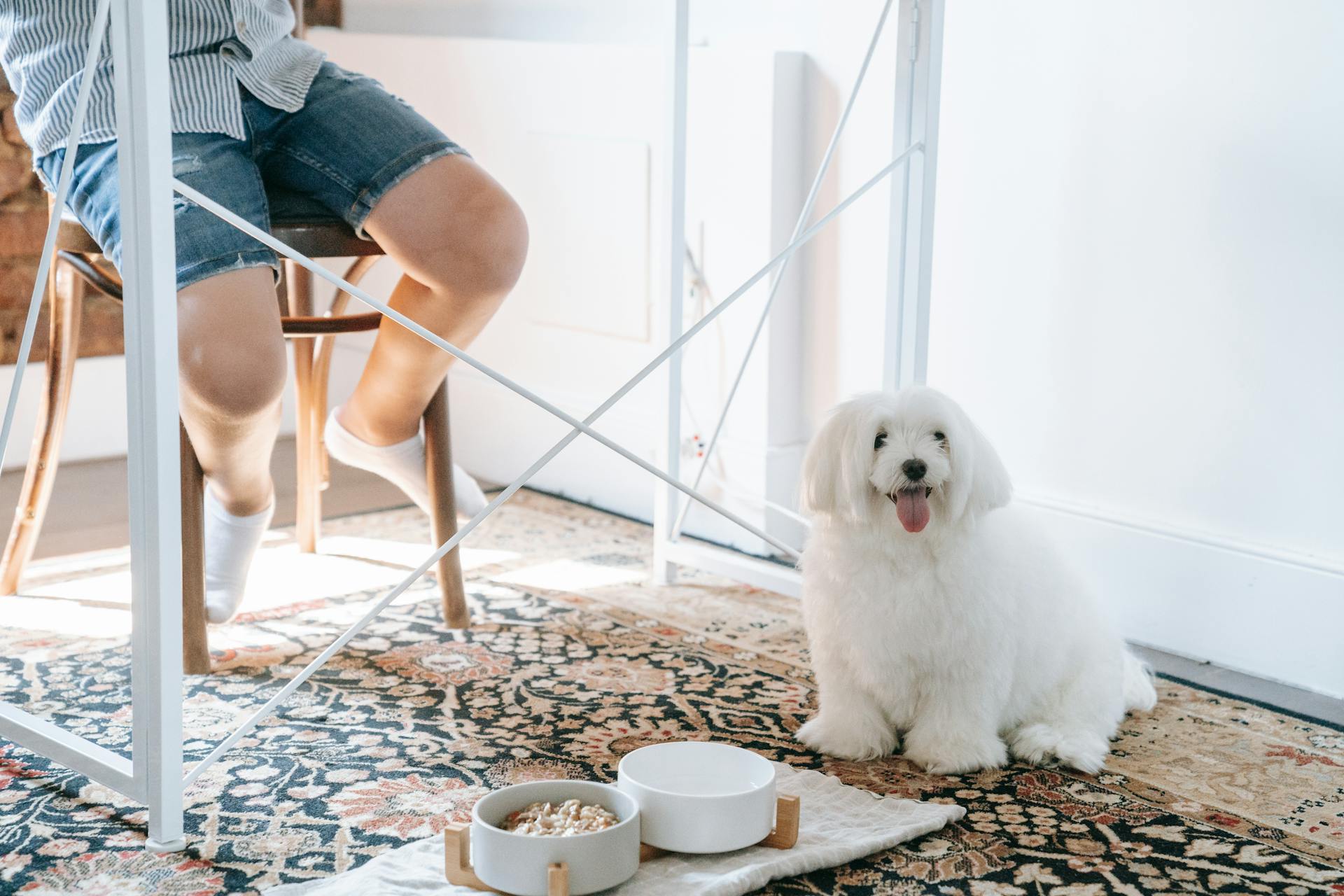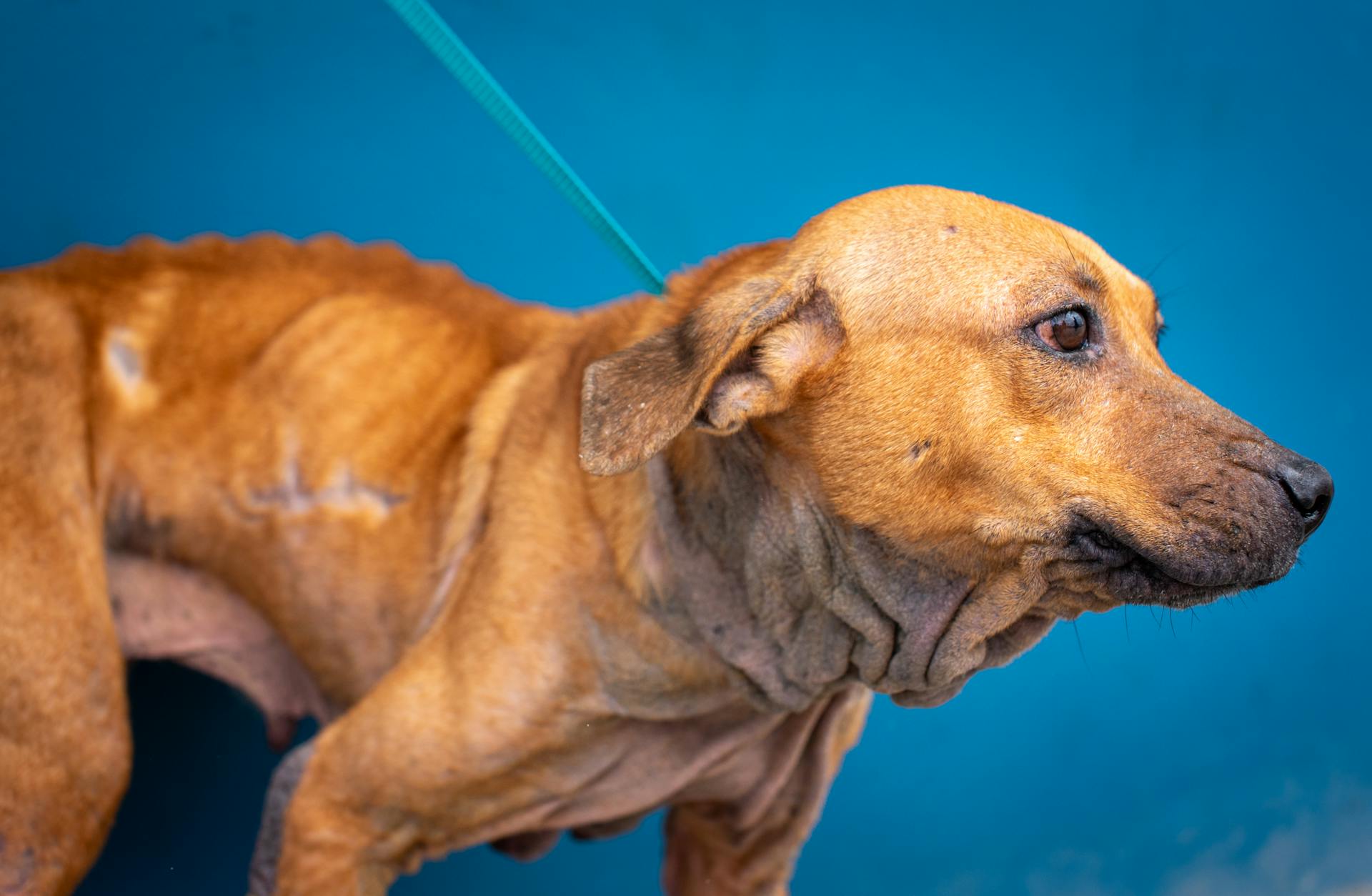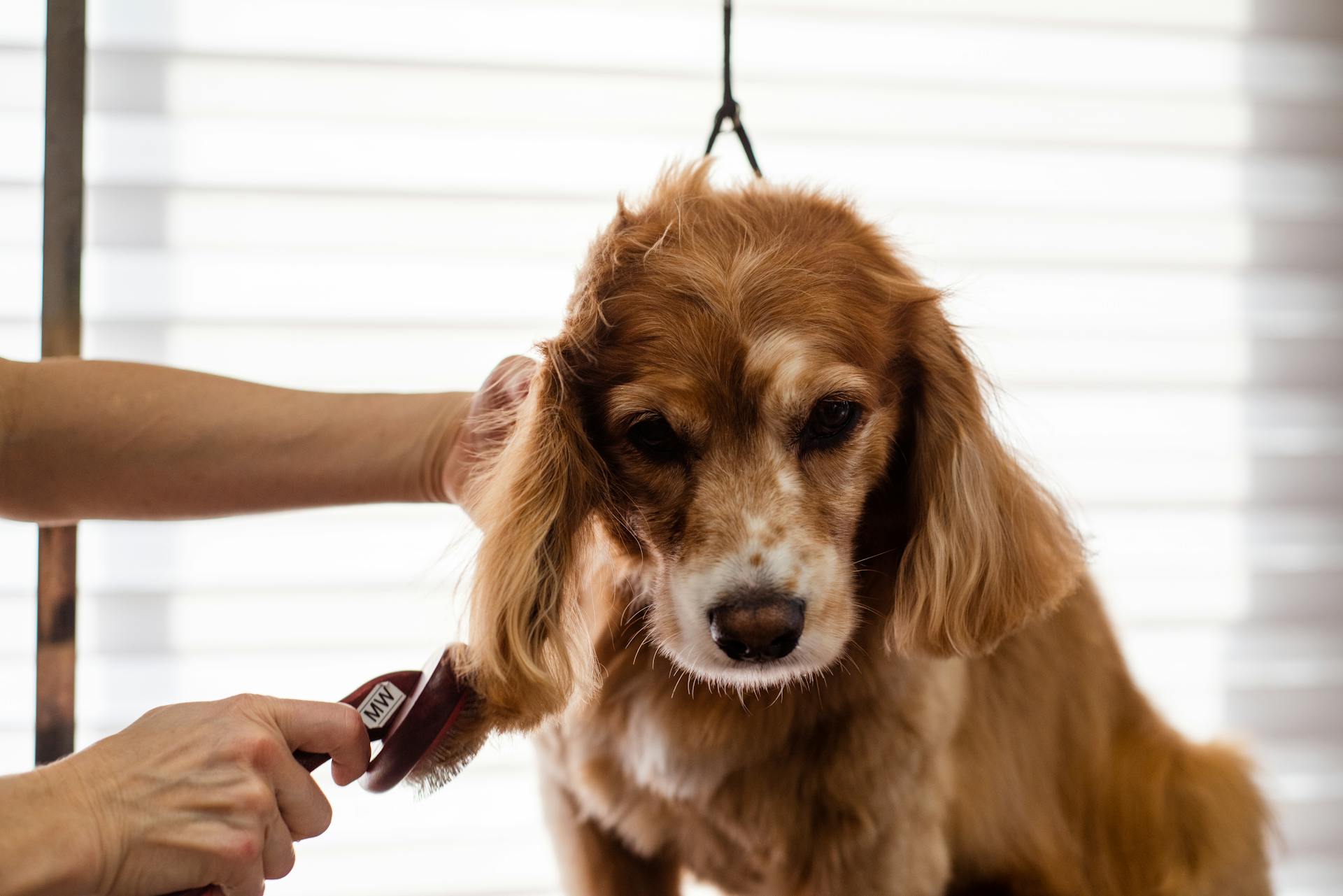
The Coton de Tulear breed is known for its friendly and affectionate nature, but like all breeds, it's not immune to certain health issues. One common concern is Patellar Luxation, a condition where the kneecap slips out of place.
This can cause discomfort and pain for the dog. It's essential to keep an eye out for symptoms like hopping or skipping.
Hip Dysplasia is another issue that can affect Coton de Tulears. This is a genetic condition where the hip joint doesn't form correctly.
Regular exercise and a healthy weight can help alleviate symptoms.
Health Issues
The Coton de Tulear is generally a healthy breed, but like all breeds, they can be prone to certain health issues. Joint issues are a concern, with some owners reporting problems with their dogs' joints, including one owner who had to have her Coton's legs operated on due to uneven bone growth.
Some Coton de Tulears may also develop health issues such as cherry eye, which requires surgical correction, and bladder stones, which can be managed with special dog food. Additionally, Coton de Tulears are at risk for heart problems, which can be monitored with regular veterinary check-ups.
Common health issues in Coton de Tulears include luxating patella, hip dysplasia, and eye problems such as multifocal retinopathy 2 and progressive retinal atrophy. Skin allergies and dental problems are also potential concerns.
Unprovoked Panting in the Breed
Unprovoked panting in the Coton breed can be a concerning behavior. It's essential to take your dog to the vet if you notice this behavior, as it could be a sign of a severe reaction to something environmental or poisonous.
Panting can often be an indication of pain, and it's better to err on the side of caution. Susan, a Coton owner, had a similar experience with her dog, who was panting and restless. They took their dog to the vet, who prescribed a mild antibiotic for stomach cramps.
If your dog is panting and restless, it's crucial to take them to the vet soon. Betty, a Bichon owner, lost her dog to a stroke, and the first sign was restlessness. She advises taking your dog to the vet immediately if you notice abnormal behavior.
The vet can help determine the cause of the panting and provide the necessary treatment. Anonymous, a concerned owner, suggests taking your dog to the vet because they might be in pain. Your dog's comfort and well-being depend on it.
Here are some possible reasons for unprovoked panting in the Coton breed:
- Severe reaction to something environmental or poisonous
- Pain, which can be caused by various factors
Prone to Infections
Cotons are prone to certain infections that can affect their health.
Ear infections are a common issue for Cotons due to their floppy ears and long fur, which can trap moisture and create a warm, humid environment that's perfect for bacterial growth.
Skin allergies can also lead to itchy skin, which if left untreated, can cause skin injuries and infections.
Regular ear cleaning and trimming the hair around their ears can help prevent ear infections.
Cotons are also more susceptible to bladder infections, especially in females, which can be treated with antibiotics.
Here are some common infections that affect Cotons:
- Ear infections
- Bladder infections (more common in females)
- Skin allergies leading to itchy skin and potential infections
Malagasy Dog
The Malagasy Dog is a breed known for its good health. The Coton de Tulear, a type of Malagasy Dog, does not suffer from a wide range of hereditary defects.
Their longevity is a notable aspect of their health. The average longevity of the Coton de Tulear is 14-19 years.
This is impressive compared to other breeds of similar size. They are considered to be healthy, long-lived dogs.
Commonality of Luxating Patellas
Luxating patellas are a common issue in the Coton breed, especially in later years. According to Example 3, this condition causes the kneecap to pop out of place, leading to symptoms like limping.
Medial patellar luxation is considered an inherited disease and is often seen in puppies. In fact, Example 4 states that it's a condition that's categorized into four grades, depending on the severity of the condition.
The severity of luxating patella can range from mild to severe, with Grade I being the mildest and Grade IV being the most severe. Surgery is often necessary for Grades III and IV, but not always for Grades I and II.
Dogs with Grades I and II should be closely monitored in case the condition gets worse. In fact, Example 4 states that dogs with Grades I and II should be kept under close observation.
Here's a breakdown of the four grades of luxating patella:
Morning Vomiting
Morning vomiting can be a real challenge to deal with. It's a common symptom of food poisoning, which can be caused by consuming contaminated food or water.
If you're experiencing morning vomiting, it's essential to stay hydrated by drinking plenty of fluids, such as water or clear broths.
Suggestion: Dog Vomiting Yellow Bile
Dog's Health Issues
The Coton de Tulear is generally a healthy breed, but like all breeds, they can be prone to certain health issues. Joint issues are a concern, with some owners reporting problems with their Coton's joints, such as lameness and arthritis.
Cotons can also be susceptible to eye problems, including cherry eye and multifocal retinopathy 2, which can cause retinal detachment. Some owners have reported issues with their Coton's vision, including progressive retinal atrophy.
Bladder infections are common in female Cotons, and can often be treated with antibiotics. Vaginitis is also a possibility, and owners should keep an eye out for symptoms such as a dark staining on the vaginal area.
For your interest: Is Lhasa Apso Good for First Time Owners
Hip dysplasia and heart problems can also occur in Cotons, so regular veterinary check-ups are essential to monitor for any potential issues. Skin allergies and dental problems are also potential concerns, as are ear infections due to the breed's floppy ears and heavy coat.
Here is a list of some common health issues that can affect Cotons:
- Luxating patella: a condition that causes the knee cap to slip out of place, leading to symptoms like limping.
- Hip dysplasia: a condition that causes the hip to develop abnormally, resulting in mobility problems.
- Heart problems: Cotons have a higher risk of heart disease, so keep an eye out for symptoms like coughing or trouble breathing.
- Eye problems: including multifocal retinopathy 2 and progressive retinal atrophy.
- Skin allergies: itchy skin might be caused by an allergy, which if not treated, could lead to skin injuries and infections.
- Dental problems: brushing your dog's teeth can help prevent infections and plaque and tartar buildup that could lead to gum disease and tooth loss.
- Ear infections: because Cotons have floppy ears and a lot of fur, they can be susceptible to infections, so keep their ears clean and the hair around their ears trimmed.
- Bladder infections: common in female Cotons, and can often be treated with antibiotics.
- Vaginitis: a possibility in female Cotons, and owners should keep an eye out for symptoms such as a dark staining on the vaginal area.
Regular veterinary check-ups, a balanced diet, and plenty of exercise can all help to keep your Coton healthy and happy.
Eye Problem Advice
Eye problems can be a concern for Coton de Tulear owners. Some breeds are more prone to eye issues than others, and Coton de Tulears are no exception.
Cotons can be susceptible to eye problems like multifocal retinopathy 2, which can cause retinal detachment, and progressive retinal atrophy (PRA), which can cause vision loss.
If your Coton is experiencing eye problems, it's essential to seek veterinary attention promptly. A vet specialist in eye issues may be necessary to diagnose and treat the problem.
Readers also liked: Progressive Retinal Atrophy in Labradors
Some owners have reported that their Cotons have had issues with "cherry eye", which can appear as a red or pink mass in the corner of the eye. This can be a breed-specific problem.
In some cases, "cherry eye" may require surgical correction, as seen in the experiences of Jolie's Mom and Pamela, who both had their Cotons undergo surgery to address the issue.
If you suspect that your Coton has an eye problem, it's crucial to keep a close eye on the issue and seek veterinary attention if it persists or worsens.
Urination and Reproductive Issues
Cotons can be prone to urinary tract infections (UTIs), with one owner reporting that their 4-month-old female Coton has had two UTIs in the past month, despite being on antibiotics.
The vet's suggestion to switch the dog's food from Holistic Select to Hills Science Healthy Advantage may be a factor in some cases, as the owner is concerned about the quality of the new food.
Consider reading: Canine Cancer Awareness Month
A homemade diet may be a viable option for some Cotons, as one owner reports that their male Coton was UTI-free for a year after switching to a homemade diet.
Some owners may want to consider a second opinion or another vet, especially if their Coton is young and has recurring UTIs.
Charlie's Cyst
Charlie's Cyst is a common issue in Coton de Tulears. It can appear as a squishy lump, usually painless, and can be found on various parts of the body, including the chest, shoulder, or back.
In some cases, cysts can be caused by an infection or a reaction to a vaccine. It's essential to have your Coton checked by a vet to determine the cause and proper treatment.
A vet tech shared her experience with a Coton named Jovi, who had a cyst on his back for a year. She recommends keeping an eye on the cyst and monitoring its size, color, and any changes. If it doesn't bother your Coton, it's likely a benign cyst.
Take a look at this: American Bully Back Leg Problems
Some owners have reported that cysts can be surgically removed, but it's not always necessary. If you notice any significant changes or if your Coton is licking or scratching at the area, it's best to consult with a vet.
Here's a list of common cyst-related issues in Coton de Tulears:
In one instance, a Coton's cyst was caused by pesticide control on the lawn. It's essential to keep your Coton's play area free of chemicals to prevent any potential health issues.
A vet recommended taking your Coton to the vet immediately for an exam if you notice a cyst. Only a professional can diagnose the issue and determine the best course of treatment.
4 Month Old UTI
If your 4-month-old Coton de Tulear is diagnosed with a UTI, you're not alone. Many Coton owners have experienced this issue with their puppies.
Crystals in the urine can be a contributing factor to UTIs in young puppies. In one case, a vet diagnosed a 4-month-old female Coton with crystals showing up in her urine.
On a similar theme: 6 Month Old Miniature Schnauzer
Some Coton owners have reported success with switching their puppies to a homemade diet to prevent UTIs. One owner, Kami, successfully treated her male Coton's UTIs and calcium oxalate crystals with a homemade diet and now has a year of being UTI, crystal, and stone free.
Holistic Select puppy food may not be the culprit behind UTIs in all cases, but in one instance, a vet recommended switching a 4-month-old Coton from this food to Hills Science Healthy Advantage prescription food.
A change in food can cause diarrhea in puppies, as seen in one case where a 4-month-old Coton developed diarrhea after switching to new food.
Here are some food options to consider for your Coton:
- Fromm Pet food, which has been used successfully by Terry's female Coton over a year.
- EVO/Innova, which was recommended by Deborah's breeder for their two male Cots.
- A homemade diet, which has been used successfully by Kami to treat her male Coton's UTIs.
If your Coton is experiencing UTIs, it's essential to consider a second opinion from another vet.
My Dog Has One Testicle
If your dog has only one testicle, it's not necessarily a cause for concern, but it's worth investigating the underlying reason.
Cryptorchidism, a condition where one or both testicles fail to descend, is a common issue in dogs.
Dogs with undescended testicles are more likely to develop testicular cancer, which is rare but serious.
In some cases, a dog may be born with only one testicle due to a genetic mutation.
This condition can also be linked to other health issues, such as inguinal hernias and undescended testicles.
It's essential to have your dog checked by a veterinarian to determine the cause of the issue.
Regular check-ups and monitoring can help prevent potential problems.
Take a look at this: One Eyed Shih Tzu
Normal Urination Frequency for Dogs
Urination frequency in dogs can vary depending on age and individual habits. A 2 1/2 year old dog urinating every 2 hours during the day is not normal.
Some dogs can go 10 or 15 minutes after drinking water without needing to urinate. However, if a dog drinks water during the day and not at night, they may need to urinate more frequently during the day.
Broaden your view: National Boston Terrier Day
If a dog can go all night without needing to urinate, it's likely not a physical issue. However, it's still a good idea to check with a vet to make sure there's no underlying medical reason.
Every 2 hours is definitely not "normal" for an adult dog. You should mention this to your vet and see if there's a medical reason for the frequent urination.
The frequency of urination can also be influenced by the dog's diet and activity level. For example, if a dog is eating a salty diet or is very active, they may need to urinate more frequently.
Here's a rough guide to urination frequency in dogs:
Keep in mind that these are general guidelines, and individual dogs may vary. If you're concerned about your dog's urination frequency, it's always best to consult with a vet.
Frequently Asked Questions
What are the disadvantages of a Coton de Tulear?
The Coton de Tulear is a breed prone to certain health issues, including luxating patella, hip dysplasia, liver shunt, disc problems, and eye concerns. Responsible ownership requires regular veterinary check-ups and a commitment to addressing these potential health concerns.
Sources
- https://www.coton-de-tulear-care.com/coton-de-tulear-health-issues.html
- https://cotondetulears.uk/health/
- https://www.pets4homes.co.uk/pet-advice/coton-de-tulear-hereditary-health-and-genetic-diversity.html
- https://www.thesprucepets.com/coton-de-tulear-dog-breed-profile-4771476
- https://www.yourpurebredpuppy.com/reviews/cotondetulear.html
Featured Images: pexels.com

